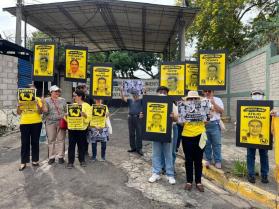Historic Minimum Wage Increase Approved in El Salvador
On, December 14th, the newly elected members of El Salvador’s National Minimum Wage Council approved the largest increase to the country’s minimum wage in history, following a hard-fought battle by the country’s labor movement to unseat the corrupt unionists that had represented them on the Council for decades. The increase, slated to take effect on January 1, 2017 represents a 102% wage increase for the country’s lowest paid workers.
The minimum wage in El Salvador is decided by a three part council made up of representatives of the government, the private sector, and labor unions; but for decades many of the country’s most prominent labor leaders have decried the individuals representing their sector on the Council as “pseudo-leaders” beholden to private sector interests. This was especially apparent in June of this year when the private sector and labor representatives on the Council banded together to reject the FMLN government’s proposed increase and, instead, approve a far lesser increase.
After refusing to ratify the inadequate increase, Minister of Labor Sandra Guevara convened elections to select new private sector and labor representatives for the National Minimum Wage Council. The elections were long overdue, given the outgoing representatives’ terms had expired in March of 2015. Guevara also created an election commission and implemented new transparency measures so the labor movement and private sector organizations could audit and oversee the elections for their sectors. unions organized and mobilized to get their affiliates out to vote. Wilfredo Berrios, of the Salvadoran Union Front (FSS), and Marta Zaldaña of the Federation of Independent Unions of El Salvador (FEASIES) became the newly elected labor representatives on the Council; both are well-respected and longtime veterans of the union movement and broader struggle for social and economic justice in El Salvador.
While the labor movement celebrated this historic victory, private sector organizations like the National Association of Private Enterprise, which represents the country’s big business sector, predictably began to complain that the election process had been “illegal and arbitrary,” and announced plans to file complaints with the International Labor Organization (ILO) and request the Supreme Court of Justice’s Constitutional Chamber declare the process unconstitutional. In response to ANEP’s announcement, labor representative Wilfredo Berríos told the press that the country’s unions would defend the democratic process and that, “we are already discussing going and requesting that the very same ILO question the private sector’s interference [in the election of labor representatives].”
ANEP not only refused to attend the swearing in of the new business and labor representatives on the Council, but did not even send their elected representatives to attend the new Council’s sessions to set a new minimum wage. In the absence of private sector representation, labor representatives and the government negotiated and approved an increase to the minimum wage that will take effect on January 1, 2017. Currently, El Salvador’s minimum wage consists of eleven different wages that differ by industry, ranging from $251 per month for the commercial and service sector to a shockingly low $98 per month for agricultural workers that harvest cotton. The newly approved increase will reduce the wage categories to four: commercial, service, and industrial workers will now earn a minimum $300 per month; workers in the textile and apparel factory (maquila) sector will now earn a minimum $295 per month; agricultural workers in coffee and sugar processing plants and those that harvest sugar cane will earn a minimum of $224 per month; and agricultural workers in the cotton industry and those that harvest coffee will earn a minimum of $200 per month.
In an editorial entitled “Finally, a win for the workers,” the Jesuit Central American University (UCA) called the minimum wage increase “one of the best Christmas gifts that could be given to the workers.” Regarding private sector criticism of the decision, the editorial stated: “Now, the new Minimum Wage Council is being questioned, but there has never before been any criticism when the supposed worker representatives got cozy with the businessmen to agree to ridiculous increases. The complaints of those that disagree with the new minimum wages are not fair nor legitimate. They are not against the legal process as they claim, but rather against no longer being allowed to continue enriching themselves at their employees’ expense, at least to the same degree they did before. With their attitude, though, it is now clear that they are against a dignified life for the workers of El Salvador.”

 "I am a CISPES supporter because continuing to fight for social justice and a more people-centered country means continuing the dream and sacrifice of thousands of my fellow Salvadorans who died for that vision.” - Padre Carlos, New York City
"I am a CISPES supporter because continuing to fight for social justice and a more people-centered country means continuing the dream and sacrifice of thousands of my fellow Salvadorans who died for that vision.” - Padre Carlos, New York City

